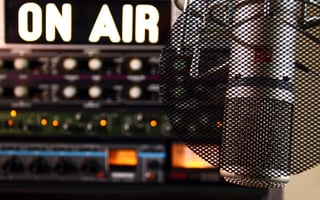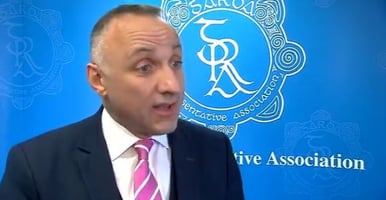Media interviews can be a bit like buses.
When was the last time you saw a spokesperson interviewed in a studio?
For the time being at least, coronavirus has made face-to-face interviews a thing of the past.
And this brave new world of online video interviews presents spokespeople with some unique challenges.
Would you know how to prepare for an interview from your living room or spare bedroom?
Here are 10 golden rules from our training by videoconference courses you need to follow for remote interview success:
Interruptions
You need to choose a room where you won’t be interrupted by family members.
At the very least, you need to ensure your family realise what you are up to so that they know not to disturb you.
The most infamous example of this was, of course, when professor Robert Kelly was interrupted by his young family during a BBC interview about politics in South Korea.
But there have been other examples during the recent coronavirus crisis. British politician Anneliese Dodds was interrupted by her young daughter during a Sky News interview about her becoming the shadow chancellor.
And Edwina Currie’s husband stumbled into an interview she was doing with Good Morning Britain, dressed in just his dressing gown – something that got far more coverage than anything she said.
Good Morning Britain in hilarious blunder as Edwina Currie's husband stumbles into live interview in his dressing gown 😂 https://t.co/R6dlcHzw0V
— The Sun (@TheSun) March 27, 2020
Edwina Currie is left in hysterics as husband wanders into her video call with GMB in his dressing gown https://t.co/SGOb3LTB9Q
— Mail+ (@DailyMailUK) March 27, 2020
Set-up
How many interviews have you seen recently where you seem to be looking at someone’s chin, their nostril hair, light-fittings or at the ceiling?
A common failing with a lot of online interviews is that the set-up is wrong.
Laptops must be elevated so that they are level with your face – using books or boxes if necessary (as long as they are stable).
A similar issue has been poor lighting. Arguably the worst example of this came when Newsnight appeared to interview the ghost of UK politician Iain Duncan Smith.
"Our next guest is the ghost of Sir Iain Duncan Smith MP" #newsnight pic.twitter.com/Qa6snHRx09
— Victoria (@missvehg) March 24, 2020
Don't sit too close to a window because you might look a little bit washed out – if you have no choice, try turning yourself side-on, so that you look softly lit from the side or try playing with the curtains to see what works.
Background
The background of choice at the moment seems to be a bookcase with a range of academic titles on display.
But that can be distracting, with viewers looking at the reading material you have on your shelves rather than concentrating on what you are saying.
Artwork can prove a similar distraction.
Choose a plain, uncluttered background and then test how it looks on camera before you go live.
Dress for the occasion
You may be in the more comfortable surroundings of your home and might have been living in tracksuits and pyjamas for the past few weeks, but you still need to look the part in your interviews.
Don’t wear anything that could distract the audience from what you want to say.
Prepare properly
Again, don’t be lulled into a false sense of security by the more relaxed environment of your home.
You still need to prepare properly.
That means knowing the message you want to get across in the interview and being prepared for the likely difficult questions that could be asked.
You might be tempted to have some notes or a crib sheet nearby.
But avoid this, as firstly you are likely to keep looking at them, which means you will lose eye contact. And secondly, you could sound scripted or over-rehearsed.
Connected
Once you are connected, assume that you are on air or are being recorded.
You don’t want to be caught on camera doing something embarrassing which may completely detract from what you have to say – you may remember what happened to Sainsbury’s CEO Mike Coupe when he was filmed singing ‘We’re in the money’ ahead of a down-the-line interview.
Remember that the interview hasn’t finished until you hear someone say that you are ‘clear’ or the connection ends.
So, remain seated and looking at the camera even if you think the interview is over.
Eye contact
The temptation with an interview carried out on online video technology is to look at the person on your screen.
But that looks like you are avoiding eye-contact on television.
Make eye-contact with your webcam and look right down the barrel of the lens to create the impression of eye-contact.
That can feel unnatural, so it is important to practice – regularly breaking that eye contact and looking away can make you seem shifty or uncomfortable.
Delay
There is a good chance that you may experience a slight delay with the technology in your online interviews.
This can lead to some awkward exchanges where the journalist and interviewee keep speaking over each other.
To avoid this scenario in your online interviews, pause briefly before you start your response.
The added benefit of this is that it gives you a moment to plan your response and can make it seem that you are carefully considering your answer.
Body language
Webcams place restrictions on what you can do with your facial expressions and body language.
But, that said, body language is still important.
Make sure you have good posture and avoid slouching.
On our media training courses we talk about BBC – Bum in the Back of the Chair and advise that spokespeople have their feet on the floor.
This good posture will help to give the impression that you are happy to be on the programme and have something to say.
Also, try to avoid the tell-tale signs of nerves, such as fidgeting with hair or glasses.
Practice makes perfect
Make sure you practice your interviews before you go on air.
Book a refresher media training course to make sure your skills are sharp.
Alternatively, ask a colleague to carry out a mock interview with realistic questions, using the video technology you will use for the interview.
But make sure they are prepared to give strong and honest feedback.
These tips will give you a good starting point for an online interview, although there really is no substitute for putting yourself to the test with a current working journalist on a training by videoconference course.
But in the current climate, where coronavirus is the only story, we have a few other tips for you.
Tone
In these times of crisis, audiences are looking for spokespeople who show empathy and appear caring. They also want them to be open, honest and credible.
It can be difficult for spokespeople to show all of these characteristics. Some experts, for example, may struggle to show empathy.
But try to get as many of these factors across as possible – it will help ensure the audience pays attention to what you have to say.
Speculation
It has never been more important to stick to what you know in an interview.
Don’t get drawn into speculating and predicting or commenting on areas beyond your expertise.
You don’t have to answer every question. Stick to what you know and what your organisation is doing.
Remember, it is ok to say that you don’t know the answer to a particular question, but go on to tell the audience what you do know.
Get in touch with your account manager to find out more about how we can help you with your internal and external communications challenges. Our bespoke, training by videoconference courses can help you make the most of online technology, whatever your experience level, ensuring you get your personal branding right and that you continue to communicate with confidence and clarity – wherever you are.
Media First are media and communications training specialists with over 30 years of experience. We have a team of trainers, each with decades of experience working as journalists, presenters, communications coaches and media trainers.
Subscribe here to be among the first to receive our blogs.




